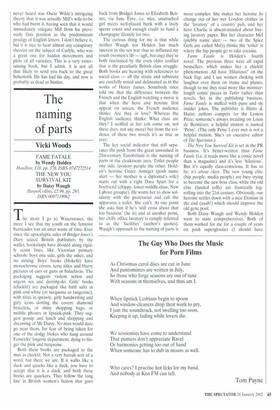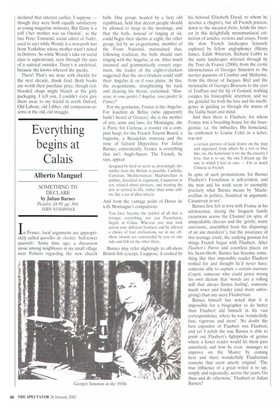The naming of parts
Vicki Woods
FAME FATALE by Wendy Holden Headline, £10, pp. 378, ISBN 0747272514 THE NEW YOU SURVIVAL KIT by Daisy Waugh HarperCollins, L.5.99, pp. 293, ISBN 0007119062 The more I go to Waterstones, the more I see that my youth on the feminist barricades was an utter waste of time. Ever since the apocalyptic sales of Bridget Jones's Diary seized British publishers by the wallet, bookshops have divided along rigidly sexist lines, like Victorian primary schools: boys one side, girls the other, and no mixing. Boys' books (blokelit) have monochrome covers, terse titles and blurry pictures of cars or guns or balaclavas. The packaging suggests violent action and urgent sex and derring-do. Girls' books (chicklit) are packaged like bath salts in pink and white (or turquoise or tangerine), with titles in sprawly, girly handwriting and girly icons dotting the covers: diamond bracelets, or shiny shopping bags, or mobile phones in lipstick-pink. They suggest gossip and lunch and shopping and dreaming of Mr Darcy. No man would dare go near them, for fear of being taken for one of the dodgy blokes who hang around Fenwicks' lingerie department, dying to finger the pink and turquoise.
Both these books are packaged to the max as chicklit. Not a very hurrah sort of a word, but there we are. If it walks like a duck and quacks like a duck, you have to accept that it is a duck, and both these books are quackers. They follow the long line in British women's fiction that goes back from Bridget Jones to Elizabeth Bennet, via Jane Eyre, i.e. nice, unattached girl meets well-placed hunk with a lively sperm count and enough credit to fund a champagne lifestyle for two.
The curious thing for me is that while neither Waugh nor Holden has much interest in the sex war that so inflamed my youth (women's lib — ugh, bor-ing) they're both fascinated by the even older conflict that is the peculiarly British class struggle. Both books are heaving with references to social class — all the strata and substrata are carefully noted and delineated as in the works of Henry James. Somebody once told me that the difference between the French and the English watching a movie is that when the hero and heroine first appear on screen, the French audience thinks: Are they in love? Whereas the English audience thinks: What class are they? I scoffed at her (oh come on, not these days, not any more) but from the evidence of these two novels it's as true as ever.
The key social indicator that still separates the posh from the great unwashed in 21st-century Eurobritain is the naming of parts in the cloakroom area. Toilet people one side, lavatory people the other. Holden's heroine Grace Armiger (posh name alert — her mother is a diplomat's wife) starts out with a right Dave Spart for a boyfriend (chippy, lower-middle-class, New Labour groupie). He wants her to show solidarity with the proletariat and call the apparatus a toilet. She can't. At one point she asks him if he's 'still cross about that loo business' (he is) and at another point, her chilly office lavatory is camply referred to as the 'facilities' (author's quotes). Waugh's approach to the naming of parts is
more complex. She makes her heroine Jo change out of her wet London clothes in the 'lavatory' of a country pub, and her hero Charlie is absent-minded about buying lavatory paper. But her character Mel (plebby name alert — two of the Spice Girls are called Mel)) thinks the 'toilet' is where the hip people go to take cocaine.
Fame Fatale is Holden's fourth novel. The previous three were all rapid bestsellers, which makes her a chicklit phenomenon. All have 'Hilarious!' on the back flap, and I see women choking with laughter over them on trains and planes, though to me they read more like monsterlength comic pieces in Tatler rather than novels. Set in the publishing business, Fame Fatale is stuffed with puns and sly insider jokes. The publisher is Hatto & Hatto; authors compete for the Lemon Prize; someone's always treading on Louis de Bernieres; a helpful minion is named `Petsy'. (The only Petsy I ever met is not a helpful minion. She's an executive editor of The Spectator.)
The New You Survival Kit is set in the PR business. It's better-written than Fame Fatale (i.e. it reads more like a comic novel than a magazine) and it's less 'hilarious'. But it's equally class-conscious. It has to be: it's about class. The new young elite (hip people, media people) are busy trying to become the new boss class, while the old elite (landed toffs) are frantically logrolling into the 21st century. Obviously, our heroine settles down with a nice Etonian in the end (aaah!) which should improve the old gene pool.
Both Daisy Waugh and Wendy Holden went to state comprehensives. Both of them worked for me for a couple of years on posh superglossies (I should have declared that interest earlier, I suppose though they were both equally satisfactory as young magazine minions). But Daisy is a toff (her mother was an Onslow', as the late Peter Townend, social editor of Tatler, used to say) while Wendy is a non-posh lass from Yorkshire whose mother wasn't noted in Debretts. So while Wendy's take on social class is aspirational, seen through the eyes of a satirical outsider, Daisy's is analytical, because she knows whereof she speaks.
There! That's me done with chicklit for the next decade, thank God. Both books are worth their purchase price, though redblooded chaps might blench at the girly packaging. I tell you, I couldn't even give them away to my friend in north Oxford. Old Labour, old Libber, old companion-atarms in the old, old struggle.



















































































 Previous page
Previous page